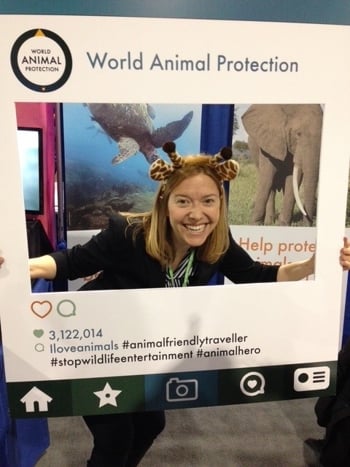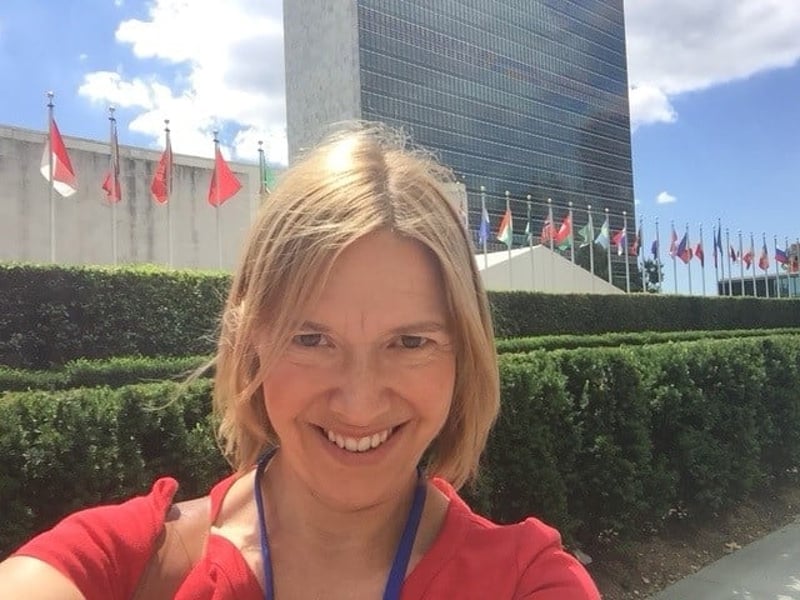
20 years of advocacy: Mel on driving change
Blog
From backyard rescues to international change, Mel has spent two decades pushing for a better world for animals.
As we mark 75 years of moving the world to protect animals, we’re celebrating the dedicated people behind that progress. Melisa Matlow, Campaign Director at World Animal Protection Canada, has been a driving force in the movement for 20 years!
Her journey began with a deep concern for animals as a child and grew into a lifelong commitment to transforming the systems that exploit them: from factory farms to the global wildlife trade.
We spoke with Mel to reflect on her two decades of advocacy, what keeps her motivated and her vision for the future of animal protection.
What inspired you to join World Animal Protection and what has kept you motivated to keep working for animals for 10+ years?
Mel: I’ve loved animals and have been concerned about the many ways they suffer, since I was little and took care of injured birds in my backyard. I questioned where meat and dairy came from and how it was produced when I was just six or seven years old and my first protest was against Marineland in Niagara Falls because I grew up nearby. So, it’s fitting that I am now working with World Animal Protection to end the exploitation of wildlife and factory farming.
My parents were raised on farms in the 1930s and 1940s when the factory farming system of food production was just being introduced so they didn’t fully understand or appreciate what I was learning about factory farming and were in disbelief when I shared my facts and figures. It wasn’t until I invited a guest speaker from my local animal protection group, to present at my high school that I learned the harsh truth and gave up eating meat for good. I studied environmental science and sustainable food systems in university and my first job was with an environmental organization to end the open season on wolves. I remember being questioned on sustainable hunting and trapping regulations, but I didn’t agree that wolves should be killed at all and even if there was a good reason for it, the method of killing mattered – it shouldn’t be by cruel and indiscriminate snares. That’s when I realized I wanted to work with an organization that advocated against animal suffering not just against species’ population decline. And since my family of farmers didn’t see animal exploitation in the same way that I did, I knew I wanted to work with an organization that approached the issue sensitively and strategically because I firmly believe we’re all losing from the factory farming system of production.
I am passionate and committed to World Animal Protection’s strategic, evidence- and solutions-based approach to change for animals, people and the planet. I am proud that we are inclusive and meet people where they are at, yet our goals for long-term change are bold and ambitious. I’ve never lost my motivation in the 20 years that I’ve been with World Animal Protection as I’ve visited farms, slaughterhouses and animal entertainment parks and witnessed the animal suffering we seek to end firsthand. I am also motivated and inspired by my passionate and extremely talented colleagues in Canada and around the world and the incredible progress we’ve already made together.
What’s one campaign or moment you’ll never forget?
Mel: There are so many that I’ll never forget including when Air Canada and Transat told me they were committing to end captive dolphin tourism – my supportive and proud colleagues encouraged me to run a victory lap around the office, and I gave them all high fives because it was a 100% team effort!
What do you think is our biggest win for animals over the years?
Mel: Too many to list, but here are a few of note:
- In 2012, we partnered with the International Federation of Red Cross and Red Crescent Societies (IFRC) to integrate our response to helping people and animals during disasters.
- In 2015, we convinced the world to agree to recognize the importance of protecting animals in disasters at the UN, with the adoption of the Sendai Framework for Disaster Risk Reduction.
- From 2015-2018, we moved more than 200 travel companies including, Thomas Cook, Contiki, Trafalgar, Intrepid, G Adventures, Booking.com, TripAdvisor, Expedia and Airbnb to stop selling and promoting elephant rides and shows and started transitioning elephant camps in Thailand to be elephant-friendly.
- In 2019 we helped move the Canadian government to ban the captivity of whales, dolphins and cetaceans and convincing Canada’s largest airline vacation companies to stop selling tickets to tourist venues around the world that exploit these animals.
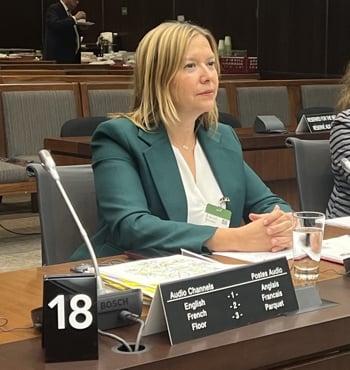
What advice would you give to someone new to animal advocacy and protection?
Mel: Change is possible when you believe it and even when working with people who might disagree with you at first.
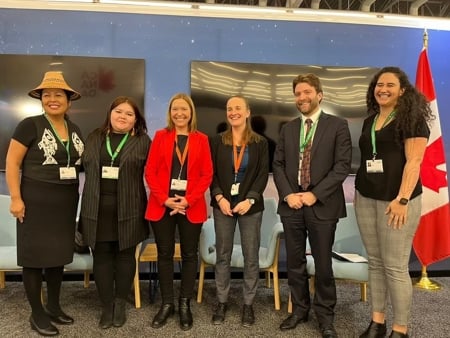
What’s your hope for animal protection in Canada over the next 10 years?
Mel: In 10 years, I expect to see an end to captive wildlife entertainment across much of the world and a growing number of countries adopt policies and incentives to shift their food systems away from factory farming and towards a more humane, sustainable, equitable and more plant-based food system.
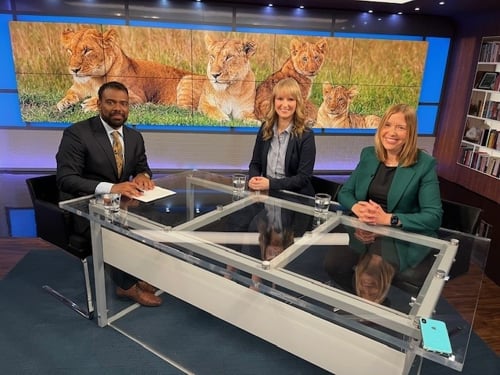
If you could be any animal, what would you choose and why?
Mel: A dolphin because I love swimming! They are also very collaborative and most species prefer warm waters and the tropics, just like me!
🐬
As we celebrate our 75th anniversary, we honour changemakers like Mel whose tireless dedication, strategic thinking and empathy have helped drive lasting change for animals around the world.
Her 20-year legacy reminds us that progress is possible when compassion meets courage and that the future of animal protection in Canada is brighter thanks to leaders like her.
